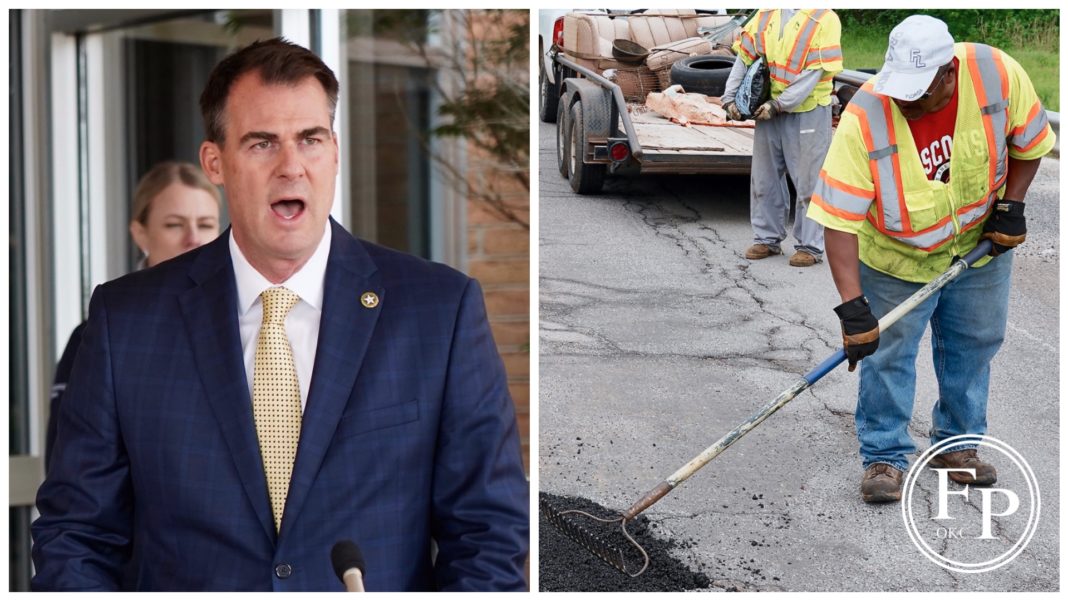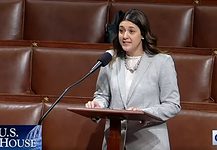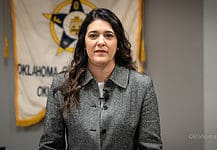Last Updated on May 1, 2020, 4:37 PM | Published: May 1, 2020
Oklahoma businesses must take heroic measures to protect employees who are being called back to work, both in terms of their health and continued employment. But as he opens a second wave of service sector businesses, Gov. Kevin Stitt’s administration is ready to crack down on workers who stay home out of concern for their health and safety.

As The Frontier reported April 29, state officials overseeing employment and business are discussing ways to cut unemployment benefits for workers who do not return to a job in the event that their former employers call them back to work. The Zoom meeting reported by both The Frontier and The Washington Post was a digital chamber of horrors for Oklahoma workers.
Teresa Thomas Keller, deputy director of the Oklahoma Employment Security Commission (OESC), demonstrated why there is no employment security during these times.
“If there is a claimant out there that says, ‘You know what, I can make more money sitting at home, drawing this extra $600, and some other benefits, then if the employer will contact us, that is considered a refusal of civil work and we will cut off their benefits,” Keller said. “I know that’s been a concern. When I first saw it, I thought, ‘Gee, some of these claimants will be making more money on unemployment than they did while they were working,’ but that will be a temporary situation.”
Commerce secretary Sean Kouplen responded by saying Keller’s plan to cut benefits was “the best news that I have heard all day.” Considering how terrible news has been for the past two months, I almost believe him.
“I have a lot of companies, and we’re trying to hire people back,” Kouplen said. “And they’re saying, ‘Nope, we’re good, we’re making plenty of money on the unemployment piece.’ So I really appreciate you saying that.”
I do not believe for one second that anyone has actually told their employer they are not coming back to work because $600 COVID-19 emergency employment benefits are so lucrative. However, this is what people like Kouplen and Keller, who were weaned politically on President Ronald Reagan’s apocryphal and unproven anecdotes about “welfare queens,” hear when workers express concern about returning to work in the middle of a pandemic.
Opinion
From George Lang, our lead opinion columnist
These comments reveal a deep distrust of workers that people like Keller are supposed to be helping. But as the OESC’s website helpfully explains, “OESC is a United States Department of Labor (USDOL) funded agency dedicated to providing quality service and assistance to Oklahoma businesses and job seekers.” Businesses come first, job seekers come second, and as Keller made clear, anyone who stays home out of concern for their health and well-being gets the shaft.
By not even adhering to the basic White House recommendation that Oklahoma have 14 days of sustained reductions in COVID-19 cases, the Stitt Administration sided with business concerns by trying to force Oklahomans back into the workplace while America is still fighting the pandemic.
Stitt, Keller, and Kouplen’s timing could be worse, but not by much. On April 30, the day before Stitt allowed restaurants to open their dining areas and gave the green light to movie theaters, sports venues, gyms, and churches to open, Oklahoma sustained its third-worst spike in COVID-19 cases since the beginning of the outbreak.
Any governor who allows reopening efforts to continue the day after 140 new cases are reported in his or her state is deaf to the concerns of workers. While people working in defense, policing and first response are in a category of their own, there are almost no jobs worth dying for, and yet there are company owners that feel like their businesses are the exception.
This week in Tracy, California, a small city located east of the San Francisco Bay Area, workers in a 50-member division left their stations at an Amazon fulfillment center after learning that two of their members had tested positive for coronavirus and one had died. They were told by management they could leave, but they would not be paid.
Amazon operates a similar facility in Oklahoma City that employs 1,500 full-time workers. If Amazon were to deny pay to any workers who stayed home out of concern for COVID-19 exposure, it would be given political cover by Stitt, OESC, and the state commerce department.
In the next two weeks, Stitt will be forced to confront his own impatience with the virus and his hasty decision to open Oklahoma businesses. One week after Georgia governor Brian Kemp signed the most sweeping reopening orders in the U.S., Atlanta Journal-Constitution reported 1,000 new cases of COVID-19 on May 1.
As Oklahoma City daredevils pour into businesses like Penn Square Mall to symbolically drink the Kool-Aid of mass coronavirus denial, Oklahoma should be ready for a Georgia-like spike in new cases. And it will be up to Stitt, Keller at OESC and Kouplen at the commerce department to decide whether they still want to force Oklahomans back into workplaces.
George Lang has worked as an award-winning professional journalist in Oklahoma City for over 25 years and is the professional opinion columnist for Free Press. His work has been published in a number of local publications covering a wide range of subjects including politics, media, entertainment and others. George lives in Oklahoma City with his wife and son.











